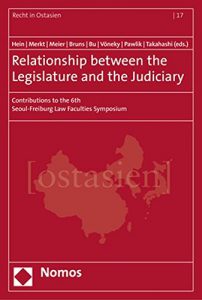Annual Survey of American Choice-of-Law Cases
Symeon Symeonides has posted on SSRN his 31st annual survey of American choice-of-law cases. The survey covers appellate cases decided by American state and federal courts during 2017. It can be found here https://ssrn.com/abstract=3093709 The table of contents is reproduced below.
Symeonides has also posted his annual Private International Law Bibliography for 2017. It can be found here https://ssrn.com/abstract=3094215.
31st Choice-of-Law Survey Table of Contents
Introduction
Part I. Jurisdiction
- The Supreme Court Speaks (Again)
- Foreign Sovereign Immunity
- The Terrorism Exception
- The Noncommercial Tort Exception
- The Expropriation Exception
- Jurisdiction Over Non-Recognized States
- The Fukushima Nuclear Accident
- The Political Question Doctrine
Part II. Extraterritoriality (or Non) of Federal Law
- Fifth Amendment
- Alien Tort Statute and Human Trafficking
- Civil Rico and Domestic Injuries
Part III. Choice of Law
- Torts
- Georgia’s Peculiar Lex Loci Rule
- Intrafamily Immunities and Families in Transit
- Vicarious Liability
- Distribution of Wrongful Death Proceeds
- Hospital Liens
- Medical Malpractice and State Immunity
- Federal Tort Claims Act and United States Immunity
- Defamation
- Extraterritoriality (or Non) of State Statutes
- Cross-Border Telephone Calls
- State Civil RICO
- Other Statutes
- Air Travel, a “Needlestick,” and the Montreal Convention
- Products Liability
- Introduction
- Cases Applying the Pro-Defendant Law of a Plaintiff-Affiliated State
- Other Cases Applying a Pro-Defendant Law
- Cases Applying a Pro-Plaintiff Law
- Contracts
- Choice-of-Law Clauses and Jury Waivers
- Choice-of-Law Clauses and Trusts
- Choice-of-Law Clauses and Old-Style Ordre Public
- Separability(?) of Choice-of-Law Clauses
- Scope of the Choice-of-Law Clause
- Choice-of-Law and Forum-Selection Clauses
- Choice-of-Law Clauses and Arbitration Clauses
- Insurance Contracts
- Choice-of-Law Methodology
- Vacillation in Wyoming
- The Methodological Table
- Statutes of Limitation
- New Jersey’s New Switch
- Summary of State Practices
- Choice-of-Law Clauses and Statutes of Limitations
- Recovering Nazi-Looted Artwork
- Marriage and Divorce
- Marital Property
Part IV. Foreign Judgments and Awards
- Sister-State Judgments
- Land in another State
- Due Process
- Statutes of Limitations
- Foreign-Country Judgments
- Paternity and Public Policy
- Child Custody and Human Rights
- Child Support
- Procedural Due Process
- Service of Process
- Jurisdiction in the State of Origin
- Judgment “Contrary” to Arbitration Agreement
- Statute of Limitations
- Foreign Arbitration Awards



